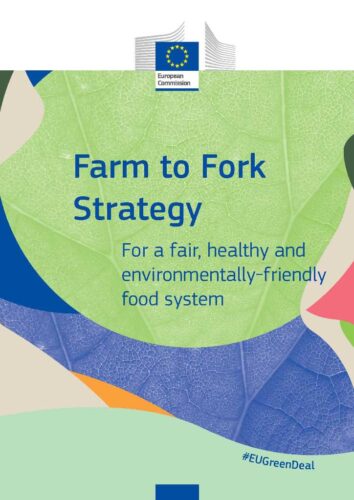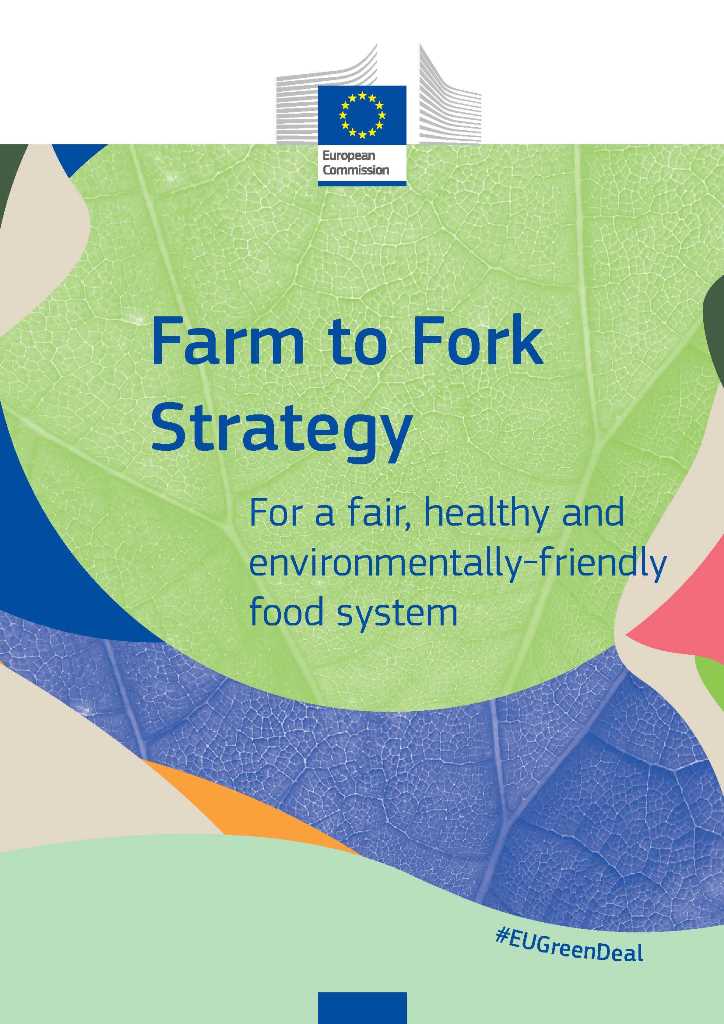Adopted on 20th May, the Farm to Fork Strategy[1] is at the heart of the Green Deal. It addresses comprehensively the challenges of sustainable food systems and recognizes the inextricable links between healthy people, healthy societies and a healthy planet.
The increasing recurrence of droughts, floods, forest fires and new pests are a constant reminder that our food system is under threat and must become more sustainable and resilient. The Farm to Fork Strategy lays down a new approach to ensure that agriculture, fisheries and aquaculture, and the food value chain contribute appropriately to the objective for a climate neutral Union in 2050. Food systems remain one of the key drivers of climate change and environmental degradation. The manufacturing, processing, retailing, packaging and transportation of food make a major contribution to GHG emissions, air, soil and water pollution, and have a profound impact on biodiversity. On the other side, consumers also need to be empowered to choose sustainable food. The creation of a favourable environment that makes it easier to choose healthy and sustainable diets will benefit consumers’ health and quality of life, and reduce health-related costs for society.
In addition, the COVID-19 pandemic has underlined the importance of a robust and resilient food system that functions in all circumstances, and is capable of ensuring access to a sufficient supply of affordable food for citizens. All citizens and operators across value chains, in the EU and elsewhere, should benefit from a just transition, especially in the aftermath of the COVID-19 pandemic and the economic downturn.
The new Farm to Fork Strategy aims at: (i) promoting circular bio-based economy, energy efficiency solutions and the use of renewable energies, (ii) reducing the use of chemical pesticides and antimicrobials, (iii) ensuring that farmers have access to a range of quality seeds for plant varieties adapted to the pressures of climate change, (iv) stimulating sustainable food processing[1], (v) reducing food loss and waste[2], (vi) promoting sustainable food consumption[3], (vii) making the best use EU space technologies (Copernicus, Galileo) to support the development of precision farming methods, and (viii) ensuring the internal EU food security in case of agricultural crises.
Investments will be necessary to encourage the transition to sustainable food systems. In 2020, the EU framework to facilitate sustainable investments (EU taxonomy) as well as the renewed strategy on sustainable finance will mobilise the financial sector to invest more sustainably, including in the agriculture and food production sector.
The EU is the biggest importer and exporter of agri-food products and the largest seafood market in the world. The sustainability of food systems is a global issue and food systems will have to adapt to face diverse challenges. Therefore, a strong cooperation with partners around the world will be essential.
The EU intend to build its international cooperation on ongoing initiatives such as “Development Smart Innovation through Research in Agriculture (DESIRA)”[4]. It will pursue the development of Green Alliances on sustainable food systems with all its partners in bilateral, regional and multilateral fora and advocate for more sustainable global food systems at international events such as the COP15 on Biodiversity and the UN Food Systems Summit in 2021.
Stella Kyriakides, Commissioner for Health and Food safety: “The Farm to Fork Strategy will make a positive difference in how we produce, buy and consume our food that will benefit the health of our citizens, societies and the environment. It offers the opportunity to reconcile our food systems with our planet’s health.”
Within its cooperation with third countries, the EU will make the best use of its trade policy, ensuring that there is an ambitious sustainability chapter in all EU bilateral trade agreements. It will play a key role in promoting global standards[1] within relevant international bodies and ensuring that for products placed in the EU market are complying with them. The EU will also boost cooperation to improve nutrition and to alleviate food insecurity by strengthening resilience of food systems and reducing food waste.

The EU will engage actively with trading partners, especially with developing countries, to accompany the transition towards the more sustainable use of pesticides to avoid disruptions in trade and promote alternative plant protection products and methods. To reduce the EU’s contribution to global deforestation and forest degradation, the Commission will present in 2021 a legislative proposal and other measures to avoid or minimise the placing of products associated with deforestation or forest degradation on the EU market. To address the global threat of antimicrobial resistance, products of animal origin imported into the EU will have to comply with strict requirements. The EU will also apply zero tolerance in the fight against illegal, unreported and unregulated fishing (IUU) and combat overfishing, promote sustainable management of fish and seafood resources.
The Commission is committed to incorporate all these priorities in the programming guidance for cooperation with third countries in the next programming period 2021-2027.
[1] To accelerate and facilitate the transition and ensure that all foods placed on the EU market become increasingly sustainable, the Commission will make a legislative proposal for a framework for a sustainable food system before the end of 2023.
[1] By helping farmers and fishers to strengthen their position in the supply chain, promoting circular business models, setting global standards for products to be placed in the EU market, reducing food packaging in line with the new Circular Economy Action Plan (CEAP), promoting tax incentives on organic and sustainable food products
[2] The Commission is also committed to halving per capita food waste at retail and consumer levels by 2030 (SDG Target 12.3)
[3] By empowering consumers to make informed, healthy and sustainable food choices (through nutrition labelling, mandatory provenance indicators and the use of digital technologies to improve food chain traceability)
[4] https://europa.eu/capacity4dev/desira
[1] COM(2020)381final


